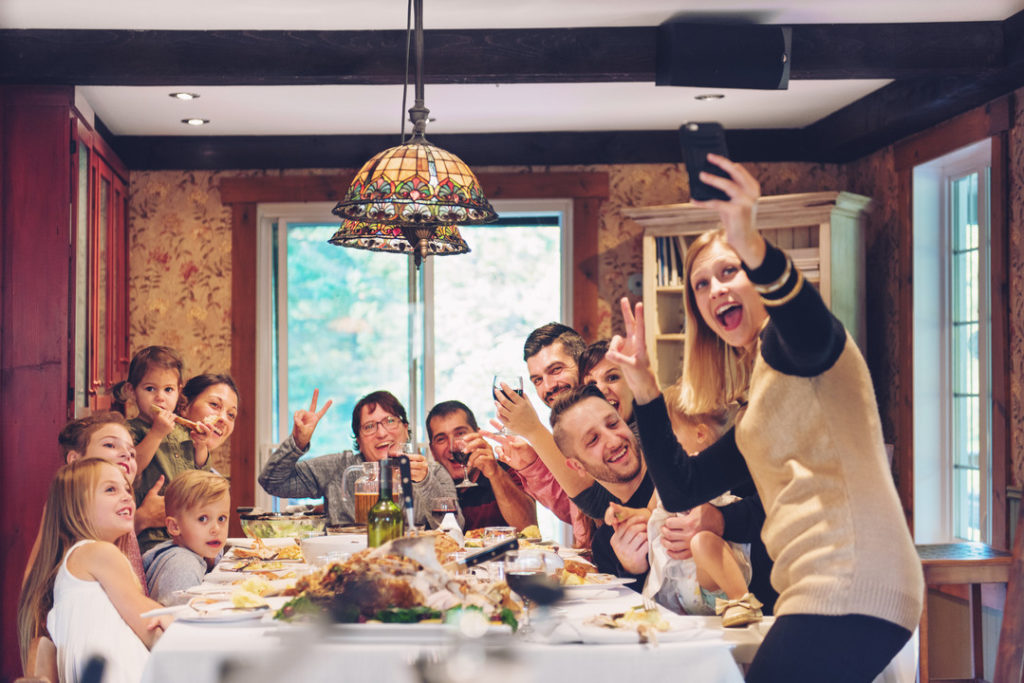Five Ways to De-Stress Holiday Togetherness

This year, AAA predicts that 54.3 million Americans will journey 50 miles or more away from home via the roads, skies, rails and waterways during Thanksgiving, the highest number since 2005. They also reported that driving times in the most congested cities could increase as much as four times longer than normal. Once you finally reach the family homestead, chances are good that you’d like to relax a bit. Until the reality of holiday togetherness dawns.
For some families, that means eating, interacting and creating memorable moments 24/7. Cramming into your childhood bedroom, where posters of N’Sync and Backstreet Boys still decorate the walls, along with your spouse and young kids. Watching “A Christmas Story” or “Home Alone” for the umpteenth time when you just want to chill out with Netflix. For others, it’s about putting up with cranky parents who bicker non-stop, Uncle Roy’s endless political rants and having Cousin Sheila get tipsy and hit on your significant other, just like she’s done with every other guy in your life since high school. Whatever the case, mandatory family gatherings can be really stressful; it even makes Consumer Report’s list of what Americans dread most about the holidays. So, here are five ways to de-stress holiday togetherness:
1. Manage expectations.
Managing expectations can make or break your holiday season. Start with setting your own. If your family has never been the warm, fuzzy sort, don’t expect them to suddenly change. Grandma is a raging hypochondriac, but you still love her even when she speculates about imaginary symptoms for hours. Recognize people for who they are and be realistic about how the time together will flow. In addition, actively manage the expectations others might have of you. Let your parents know in advance that there are no plans to get engaged, have a baby, buy a new home, change jobs or whatever hot button topic they typically might ask you about. Enlist supportive family members to be allies if those subjects come up anyway. Yup, some family gatherings can feel like an episode of Survivor, just with more food, clothing and shelter options.
2. Practice self-care.
In your everyday life, you may eat clean, get plenty of sleep and regularly exercise. But the moment you step into your childhood home, all bets are off. You consume four helpings of Thanksgiving dinner with the fervor of an offensive tackle getting ready for the playoffs. Wine seems to cut the family drama and you guzzle it by the bottle. All of which gives you a raging cheap vino and post-turkey food hangover. While holidays tend to promote over-indulgence, practicing your regular self-care habits is key to ensuring you feel good and support yourself.
3. Encourage movement.
It can be hard to keep up an exercise routine when visiting family if the nearest spin studio is 20 miles away and locals have never heard of a Pilates reformer. Consider planning fitness activities that you can embrace with other family members. For example, get people together to take a walk around the neighborhood. Organize a game of touch football. (Full disclosure: that last idea is based on my idealized version of the Kennedys from old newsreels; my family would have laughed their butts off if I ever suggested like that.) If the weather sucks, check out indoor spaces like bowling alleys, skating rinks, trampoline jumping facilities and more that can still get your body moving.
4. Focus on gratitude.
You have the wonderful power of choosing your attitude. By focusing on what makes you grateful about the holiday – seeing family members who are still in good health, your close relationship with your brother, being able to afford an airplane ticket now after years of struggling financially – you accentuate the positive and set a different, more upbeat tone for the holiday. Here are three tips for becoming more grateful.
5. Introduce new traditions.
If the most stressful part of the holiday is preparing and cleaning up after a big meal, perhaps your family can try out a restaurant instead this year. Do annual snowstorms typically create problems in reaching the family homestead? Maybe it’s time to check out a family cruise or warm-weather spot to recraft the holiday as a vacation experience. If your family is open, talk to them in advance about testing out new traditions that can decrease stress and increase everyone’s happiness.
How do you handle the stress of family gatherings over the holidays? Have you ever tried to introduce new traditions and if so, how did it go?
